When people hear the name Grigori Rasputin, their minds almost immediately begin to wander. The stories told about this so-called “Mad Monk” suggest he possessed some magical powers, or that he had a special connection to God.
But they also suggest he was a sex-crazed maniac who used his position of power to seduce women and engage in all sorts of sins that would be considered terrible now and unspeakable back then.
Other tales indicate he was a man who went from being a poor, nameless peasant to one of the Tsar’s most trusted advisors in a matter of just a few short years, perhaps more proof he possessed some special or even magical powers.
However, many of these stories are just that: stories. It’s fun to believe they are true, but the reality is that many of them are not. But not everything we know about Grigori Yefimovich Rasputin is made up.
For example, he was known for having a strong sexual appetite, and he did manage to get exceptionally close to the imperial family for someone of such a humble background. Yet his healing powers and political influence are gross exaggerations.
Instead, the self-proclaimed holy man was merely in the right place at the right time in history.
Recommended Reading
FREEDOM! The Real Life and Death of Sir William Wallace
Diverse Threads in the History of the United States: The Life of Booker T. Washington
Who was Grigori Rasputin? The Story of the Mad Monk Who Dodged Death
Why, then, are there so many legends about this exceptionally unimportant Russian mystic? Well, he rose to prominence in the years leading up to the Russian Revolution.
Political tensions were high, and the country was very unstable. Different political leaders and members of the nobility were looking for ways to undermine the Tsar’s power, and Rasputin, an unknown, rather strange religious man who came out of nowhere to become close with the royal family proved to be the perfect scapegoat.
As a result, all sorts of stories were thrown about meant to tarnish his name and destabilize the Russian government. But this destabilization was already underway before Rasputin emerged onto the scene, and within a year of Rasputin’s death, Nicholas II and his family were murdered and Russia was changed forever.
However, despite the falsity of many of the stories surrounding Rasputin, his story is still an interesting one, and it’s a great reminder of how just how malleable history can be.
Rasputin Fact or Fiction
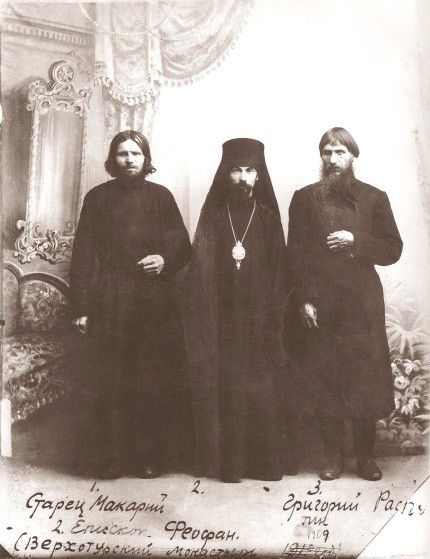
Due to his closeness to the royal family, as well as the political situation at the time, public knowledge of Rasputin is the result of rumors, speculation, and propaganda. And while it’s true we still don’t know a lot about Rasputin and his life, historical records have allowed us to distinguish between fact and fiction. Here are some of the more famous tales about Rasputin:
Rasputin Had Magical Powers
Verdict: Fiction
Rasputin made a few suggestions to the Tsar and Tsarina of Russia about how to treat their son Alexei’s hemophilia, and this caused many to believe he possessed special healing powers.
However, it’s far more likely he simply got lucky. But the mysterious nature of his relationship with the royal family led to lots of speculation, which has warped our image of him to this day.
Rasputin Ran Russia From Behind the Scenes
Verdict: Fiction
Shortly after arriving in St. Petersburg, Grigori Yefimovich Rasputin made some powerful friends and eventually became very close to the royal family. However, as far as we can tell, he had little to no influence over the political decision-making process. His role in court was limited to religious practice and also to help with the children. Some rumors swirled about how he was helping Alexandra, the Tsarina, collaborate with her home country, Germany, to undermine the Russian Empire, but there is also no truth to this claim whatsoever
Rasputin Could Not Be Killed
Verdict: Fiction
No one can escape death. However, an attempt was made on Rasputin’s life before he was finally killed, and the story about his actual death helped propagate the idea that he could not be killed. But it’s more likely these stories were told to help spread the idea that Rasputin was associated with the devil and had “unholy” powers.
Rasputin was a Crazy Monk
Verdict: Fiction
First, Rasputin was never ordained as a monk. And as for his sanity, we don’t really know, although his rivals and those seeking to either undermine or support Tsar Nicholas II certainly worked to position him as crazy. Some of the written records he has left behind suggest he had a scattered brain, but it’s also just as likely that he was poorly educated and lacked the ability to clearly express his thoughts with written words.
Rasputin Was Sex-Crazed
Verdict: ?
Those who sought to damage Rasputin’s influence certainly wanted people to think this, so it’s likely their stories are exaggerated at best and invented at worst. However, stories of Rasputin’s promiscuity started surfacing as soon as he left his hometown in 1892. But this idea that he was sex-crazed was likely the result of his enemies trying to use Rasputin as a symbol for everything that was wrong in Russia at the time.
The Story of Rasputin
As you can see, most of the things we consider to be true about Rasputin are actually false or at the very least exaggerated. So, what do we know? Unfortunately, not much, but here’s a detailed summary of the facts that do exist about the famously mysterious life of Rasputin.
Who Was Rasputin?
Rasputin was a Russian mystic who lived during the final years of the Russian Empire. He rose to prominence in Russian society starting around 1905 because the royal family at the time, led by Tsar Nicholas II and his wife, Alexandra Feodorovna, believed he possessed the ability to heal their son, Alexei, who suffered from hemophilia. Eventually, he fell out of favor amongst the Russian elite as the country experienced considerable political turmoil leading up to the Russian Revolution. This led to his assassination, the gory details of which have helped make Rasputin one of the most well-known figures in history.
Childhood
Grigori Yefimovich Rasputin was born in Pokrovskoye, Russia, a small town in the northern province of Siberia, in 1869. Like many of the people in the area at the time, he was born to a family of Siberian peasants, but beyond that, Rasputin’s early life remains mostly a mystery.
Accounts exist that claim he was a troublesome boy, someone who was prone to fighting and had spent a few days in jail due to his violent behavior. But there is little validity to these accounts as they were written after the fact by people who likely did not know Rasputin as a child, or by people whose opinion had been swayed by their opinion of him as an adult.
Part of the reason we know so little about the early year of Rasputin’s life is that he and those around him were most likely illiterate. Few people living in rural Russia at the time had access to formal education, which led to low literacy rates and poor historical accounts.
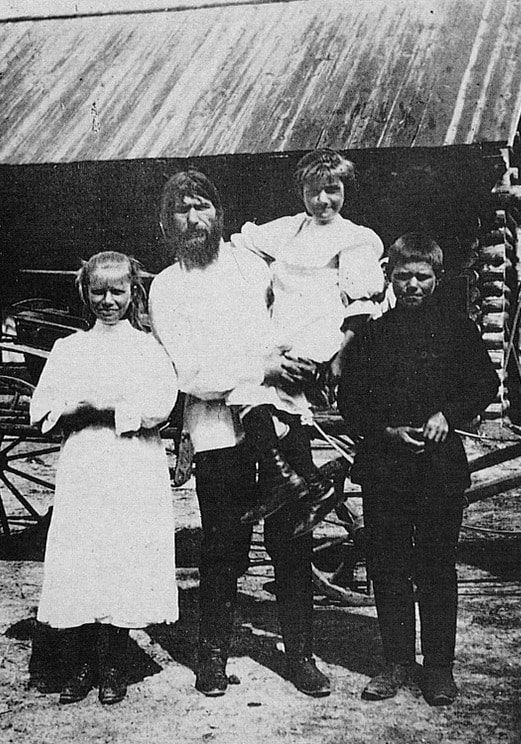
However, we do know that at some point in his twenties, Rasputin had a wife and several children. But something happened that caused him to suddenly need to leave Pokrovskoye. It’s possible he was running from the law. There are some accounts that he left to escape punishment for stealing a horse, but this has never been verified. Others claim he had a vision from God, yet this has also not been proven.
As a result, it’s equally possible he simply had an identity crisis, or that he left for some reason that remains entirely unknown. But despite the fact we don’t know why he left, we do know that he set out on a pilgrimage in 1897 (when he was 28), and this decision would dramatically alter the course of the rest of his life.
Latest Biographies
Queen Zenobia: The Charismatic Empress of Ancient Syria
Eleanor of Aquitaine: A Beautiful and Powerful Queen of France and England
Frida Kahlo Accident: How a Single Day Changed an Entire Life
Early Days as a Monk
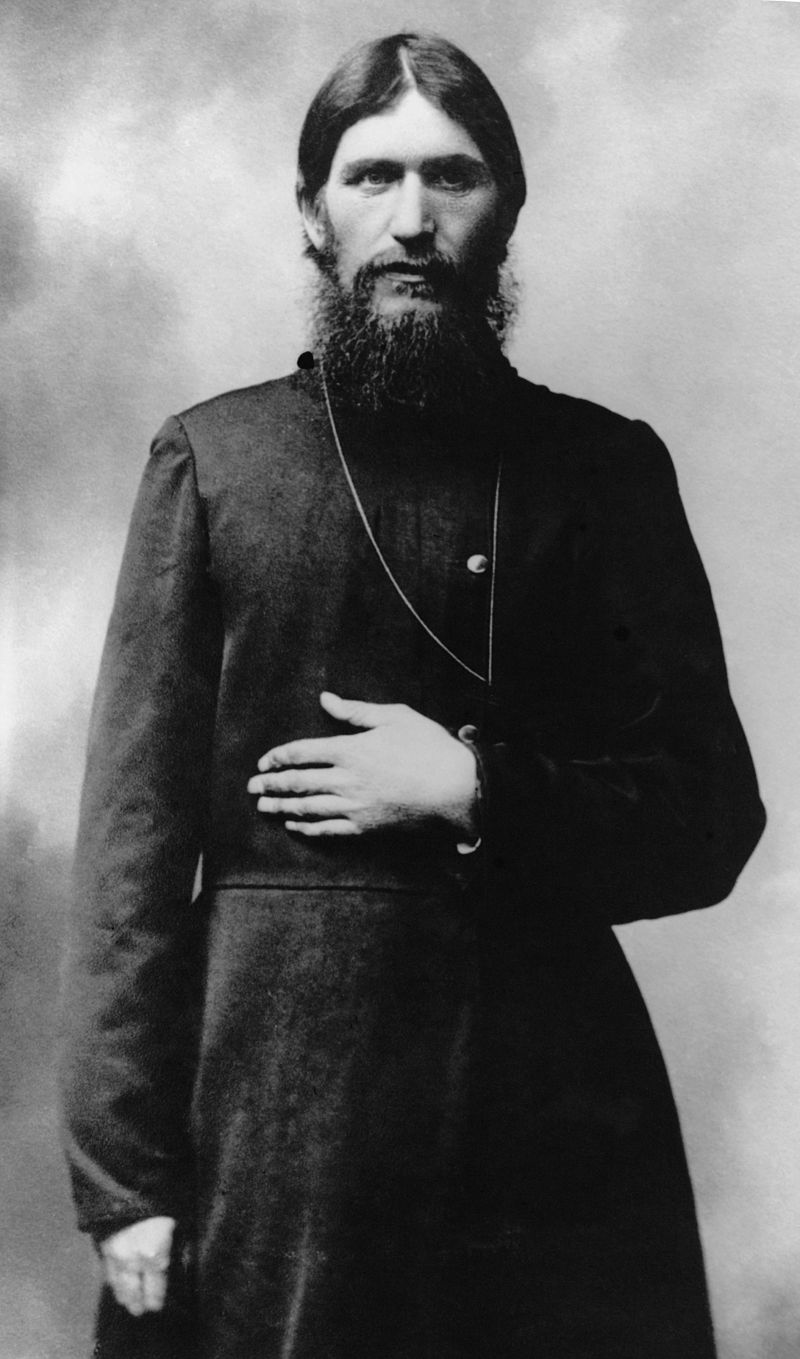
It’s believed that Rasputin first left home for religious and or spiritual purposes around 1892, but he returned frequently to his hometown to attend to his familial obligations. However, after his visit to the St. Nicholas Monastery in Verkhoturye in 1897, Rasputin became a changed man, according to accounts. He began to go on longer and longer pilgrimages, possibly reaching as far south as Greece. However, it’s important to point out that the ‘holy man’ never took vows to become a monk, making his name, “The Mad Monk,” a misnomer.
During these years of pilgrimage towards the end of the 19th century, Rasputin began to develop a small following. He would travel to other towns to preach and teach, and when he returned to Pokrovskoye he allegedly had a small group of people with whom he would pray and perform ceremonies. However, elsewhere in the country, especially in the capital, St. Petersburg, Rasputin remained an unknown entity. But a series of fortunate events would change that and propel Rasputin to the forefront of Russian politics and religion.
The self proclaimed ‘holy man’ was a mystic and had a powerful personality, one that easily allowed him to affect those around him, usually making them feel quite at ease and safe around him. Whether or not he was truly a man gifted with magical talents is a matter for the theologians and philosophers to argue about, but it can be said that he commanded a certain aura of respect when he walked the earth.
Russia at the Time of Rasputin
To understand the story of Rasputin and why he has become such an important figure in Russian and world history, it’s best to understand the context in which he lived. Specifically, Rasputin arrived in St. Petersburg at a time of tremendous social upheaval in the Russian Empire. The Tsarist government, which ruled as an autocracy and upheld a system of feudalism that dated back centuries, was beginning to crumble. The urban middle classes, which were developing as a result of the slow process of industrialization that had taken place throughout the 19th century, as well as the rural poor, were beginning to organize and seek out alternative forms of government.
This, plus a combination of other factors, meant that the Russian economy was in steady decline by the beginning of the 20th century. Tsar Nicholas II, who was in power from 1894-1917, was insecure about his ability to rule what was obviously a crumbling country, and he had made many enemies amongst the nobility who saw the state of the empire as an opportunity to expand their power, influence, and status. All of this led to the formation of a constitutional monarchy in 1907, which meant that the Tsar, for the first time ever, would need to share his power with a parliament, as well as a prime minister.
This development seriously weakened the power of Tsar Nicholas II, although he retained his position as head of the Russian state. Yet this temporary truce did little to resolve the instability going on in Russia, and when World War I broke out in 1914 and the Russians entered the fight, revolution was imminent. Just one year later, in 1915, 9the war had taken its toll on the weak Russian economy. Food and other crucial resources became scarce, and the working classes grew weak. Tsar Nicholas II took control of the Russian army, but this probably made the situation worse. Then, in 1917, a series of revolutions, known as the Bolshevik Revolution, took place, which ended the Tsarist autocracy and paved the way for the formation of the United Soviet Socialist States (USSR). While all this was taking place, Rasputin managed to become close to the Tsar, and he eventually became a scapegoat for his political rivals as they sought to weaken Nicholas II and improve their own position in society.
Rasputin and the Imperial Family
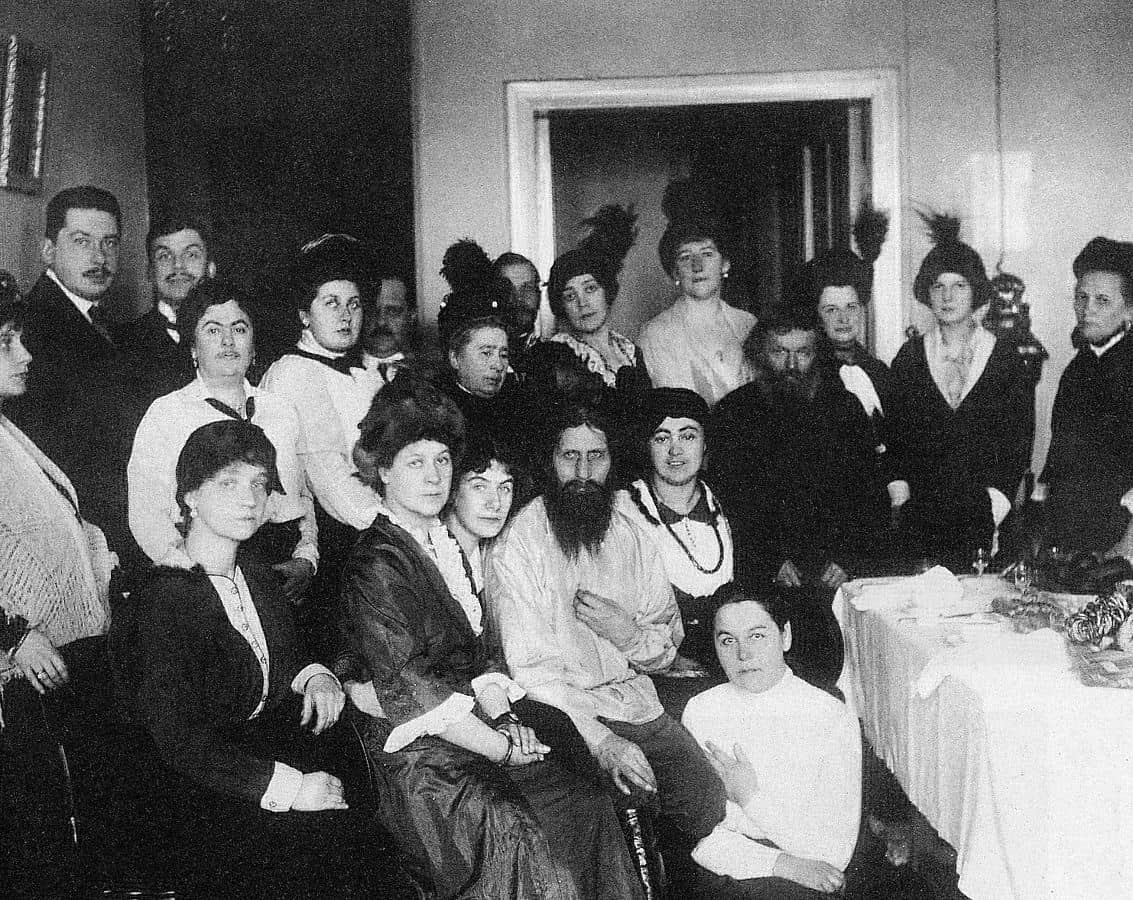
Rasputin first arrived in the Russian capital, St. Petersburg, in 1904, after receiving an invitation to visit the St. Petersburg Theological Seminary at the Alexander Nevsky Monastery thanks to a letter of recommendation written by well-respected members of the church elsewhere in Russia. However, when Rasputin arrived to St. Petersburg, he would have found a city in disrepair, which was a reflection of the state of the Russian Empire at the time. Interestingly, Rasputin’s influence and reputation preceded him in St. Petersburg. He was known to be a heavy drinker and somewhat of a sexual deviant. In fact, before arriving at St. Petersberg, there were rumors that he had been sleeping with many of his female followers, although there is no definitive proof this was happening.
These rumors later led to accusations that Rasputin was a member of the Kyhlyst religious sect, which believed in using sin as the primary means of reaching God. Historians still debate whether this is true or not, although there is considerable evidence that Rasputin enjoyed engaging in activities that one could classify as depraved. It’s quite possible Rasputin spent time with the Kyhlyst sect so as to try out their method of religious practice, but there is no evidnece he was an actual member. However, it’s also just as likely that political enemies of the Tsar, and Rasputin, exaggerated behavior typical of the time so as to damage Rasputin’s reputation and diminish his influence.
After his initial visit to St. Petersberg, Rasputin returned home to Pokrovskoye but began to make more frequent trips to the capital. During this time, he began making more strategic friendships and built a network within the aristocracy. Thanks to these connections, Rasputin met the Nicholas II and his wife, Alexandra Feodorovna, for the first time in 1905. He managed to meet the Tsar several more times, and at one point, Rasputin met the Tsar and Tsarina’s children, and from that point on, Rasputin became much closer to the imperial family largely because the family was convinced Rasputin possessed the magical powers needed to cure their son Alexei’s hemophilia.
Rasputin and the Royal Children
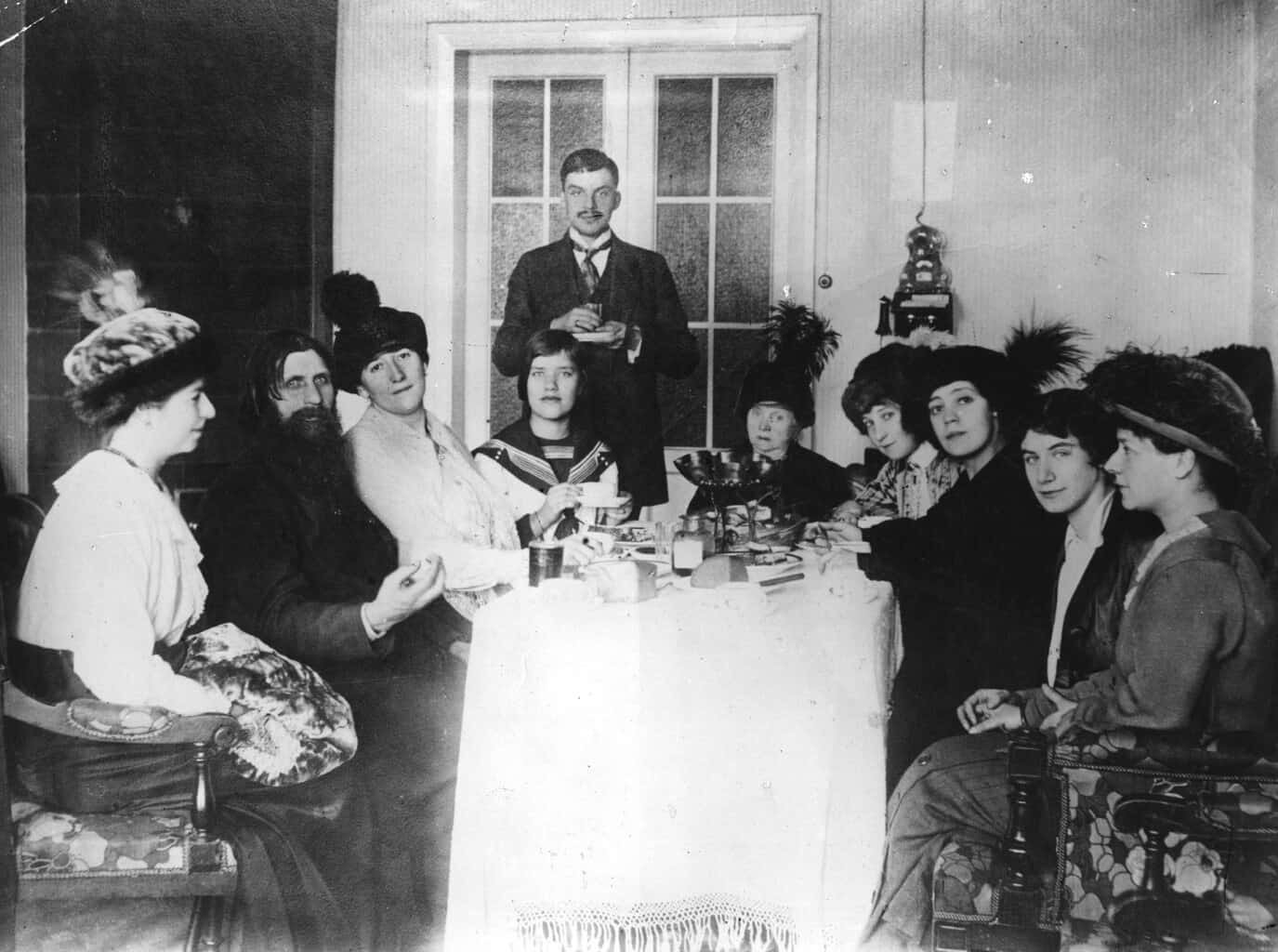
Alexei, the heir to the Russian throne and a young boy, was rather ill due to the fact that he had incurred an unfortunate injury to his foot. Furthermore, Alexei suffered from hemophilia, a disease characterized by anemia and excessive bleeding. After several interactions between Rasputin and Alexei, the imperial family, especially the Tsarina, Alexandra Feodorovna, became convinced that Rasputin alone possessed the powers needed to keep Alexei alive.
He had been asked on several occasions to pray for Alexei, and this coincided with an improvement in the boy’s condition. Many believe this is why the imperial family became so convinced Rasputin had the power to heal their sick child. Whether or not they thought he had magical powers is unclear, but this belief that Rasputin had some special quality that made him uniquely capable of healing Alexei helped boost his reputation and made him both friends and enemies in the Russian court.
Rasputin as a Healer
One of the theories as to what Rasputin did was that he simply had a calming presence around the boy that caused him to relax and stop thrashing about, something that would have helped stop the bleeding brought on by his hemophilia.
Another theory is that when Rasputin was consulted during a particularly serious moment when Alexei had suffered a hemorrhage, he told the imperial family to keep all doctors away from him. Somewhat miraculously, this worked, and the imperial family attributed this to Rasputin’s special powers. However, modern historians now believe this worked because the most common medicine used at the time was aspirin, and using aspirin to stop bleeding doesn’t work because it thins the blood. Therefore, by telling Alexandra and Nicholas II to avoid doctors, Rasputin helped Alexei avoid taking medicine that probably would have killed him. Another theory is that Rasputin was a trained hypnotist who knew how to calm the boy enough so that he would stop bleeding.
Again, though, the truth remains a mystery. But what we do know is that after this point, the royal family welcomed Rasputin into their inner circle. Alexandra seemed to trust Rasputin unconditionally, and this allowed him to become a trusted advisor of the family. He was even appointed as the lampadnik (lamplighter), which allowed Rasputin to light the candles in the royal cathedral, a position that would have given him daily access to Tsar Nicholas and his family.
The Mad Monk?
As Rasputin got closer and closer to the center of Russian power, the public grew more and more suspicious. The nobles and elite within the courts began to view Rasputin with envy due to the fact that he had such easy access to the Tsar, and, seeking to undermine the Tsar, they tried to position Rasputin as a mad man who was controlling the Russian government from behind the scenes.
To do this, they began to exaggerate some aspects of Rasputin’s reputation which he had carried with him since he first left Pokrovskoye, mainly that he was a drinker and a sexual deviant. Their propaganda campaigns even went so far as to convince people that the name “Rasputin” meant “debauched one,” despite the fact that it actually meant “where two rivers join,” a reference to his hometown. Furthermore, it was around this time that accusations of his associations with the Khylists began to intensify.
It should be noted, though, that some of these accusations were grounded in truth. Rasputin was known for taking many sexual partners, and he was also known for parading around the Russian capital showing off the silks and other textiles that had been embroidered for him by the royal family.
Criticisms of Rasputin intensified after 1905/1906 when the enactment of the Constitution granted the press considerable more freedom. They targeted Rasputin more perhaps because they still feared to attack the Tsar directly, choosing instead to attack one of his advisors.
However, the attacks did not only come from the enemies of the Tsar. Those who wanted to maintain the power structures at the time also turned against Rasputin, largely because they felt the Tsar’s loyalty to him hurt his relationship with the public; most people bought into the stories about Rasputin, and it would have looked bad if the Tsar was keeping a relationship with such a man, even if almost every aspect of the stories were exaggerations. As a result, they wanted to take out Rasputin so that the public would cease worrying about this supposed crazy monk who was secretly controlling the Russian Empire.
Rasputin and Alexandra
Rasputin’s relationship with Alexandra Feodorovna is another source of mystery. The evidence we have seems to suggest that she trusted Rasputin greatly and cared for him. There were rumors that they were lovers, but this has never been proven to be true. However, as public opinion turned against Rasputin and members of the Russian court began to see him as a problem, Alexandra made certain he was permitted to stay. This caused more tension as many people’s imaginations continued to run wild with the idea of Rasputin was the real controller of the royal family. The Tsar and Tsarina made things worse by keeping their son’s health a secret from the public. This meant no one knew the real reason why Rasputin had become so close to the Tsar and his family, creating more specualtion and rumors.
This close connection shared between Rasputin and Empress Alexandra further degraded Rasputin’s reputation, as well as that of the royal family. For example, by the outbreak of World War I, most people in the Russian empire assumed Rasputin and Alexandra were sleeping together. Soldiers spoke about it at the front as if it were common knowledge. These stories got even more grandiose when people began speaking about how Rasputin was really working for the Germans (Alexandra was originally from a German royal family) to undermine Russian power and cause Russia to lose the war.
An Attempt On Rasputin’s Life
The more time Rasputin spent around the royal family, the more it seemed people tried to tarnish his name and reputation. As mentioned, he was labeled as a drunk and a sexual deviant, and this eventually led to people calling him a wicked man, a crazy monk, and a devil worshipper, although we now know these to be not much more than attempts to make Rasputin a political scapegoat. However, opposition to Rasputin grew enough that an attempt was made to take his life.
In 1914, as Rasputin was in transit to the post office, he was accosted by a woman disguised as a beggar and stabbed. But he managed to escape. The wound was severe and he spent several weeks in recovery after surgery, but he eventually returned to full health, something that would be used to continue to shape public opinion about him even after his death.
The woman who stabbed Rasputin was said to be a follower of a man named Iliodor, who had been the leader of a powerful religious sect in St. Petersburg. Iliodor had denounced Rasputin as an antichrist, and he had previously made attempts to try and separate Rasputin from the Tsar. He was never formally accused of the crime, but he did flee St. Petersburg shortly after the stabbing and before the police had the chance to question him. The woman who actually stabbed Rasputin was deemed insane and was not held responsible for her actions.
Rasputin’s Real Role in the Government
Despite the fact that so much was made of Rasputin’s behavior and his relationship to the royal family, very little if any evidence exists that proves Rasputin had any real influence over the affairs of Russian politics. Historians agree he did the royal family a great service by praying with them and assisting with the ill children and giving advice, but most also agree that he had no real say in what the Tsar did or did not do with his power. Instead, he proved to be a proverbial thorn in the side of the Tsar and Tsarina as they tried to deal with an increasingly unstable political situation that was rapidly descending into upheaval and overthrow. Perhaps, for this reason, Rasputin’s life was still in danger immediately following the first attempt made against his life.
Rasputin’s Death
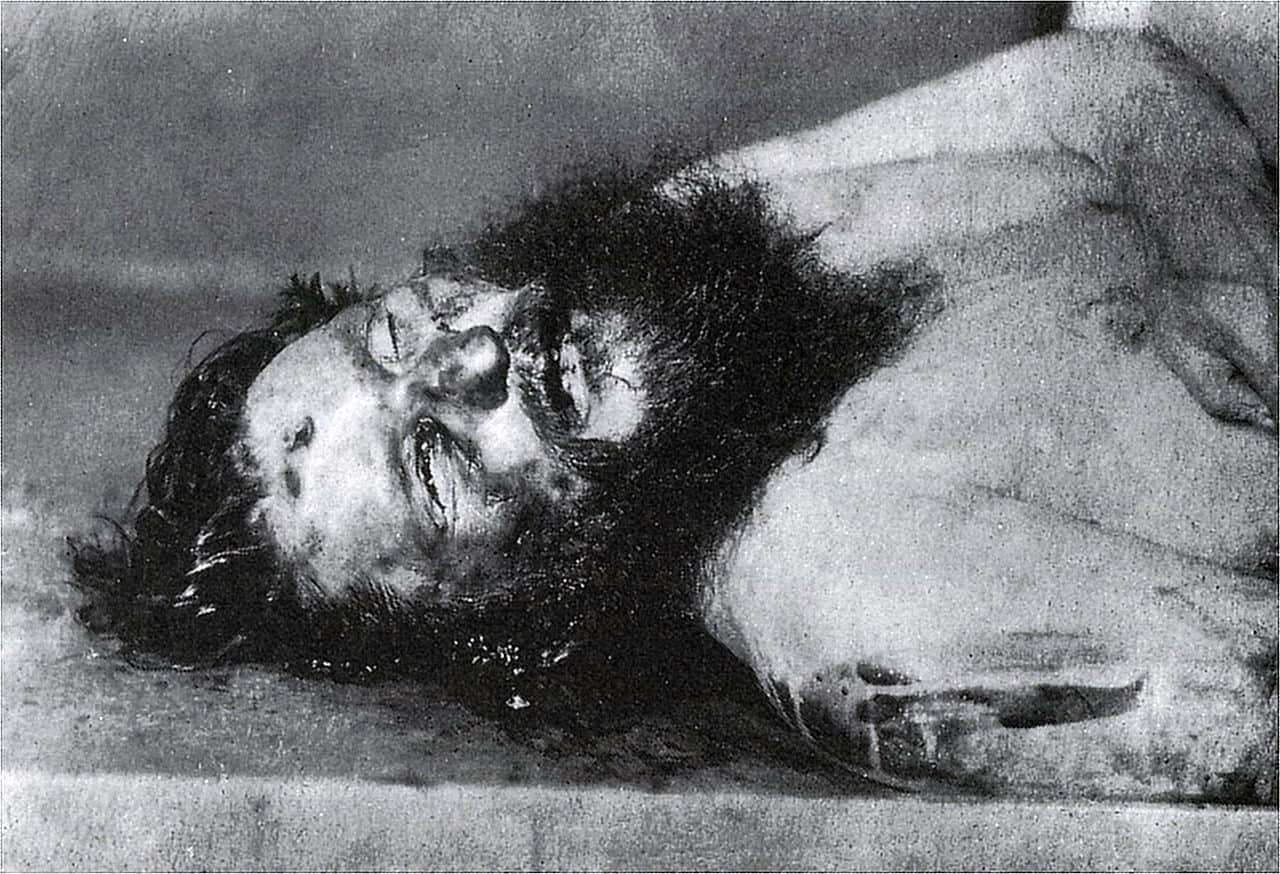
The actual murder of Grigori Yefimovich Rasputin is a widely disputed and heavily fictionalized story involving all sorts of crazy antics and stories about the man’s ability to evade death. As a result, it has been very difficult for historians to find the actual facts surrounding Rasputin’s death. Furthermore, he was killed behind closed doors, which has made it even more difficult to determine exactly what happened. Some accounts are embellishments, exaggerations, or just complete fabrications, but we can never really know for sure. However, the most common version of Rasputin’s death goes like this:
Rasputin was invited to dine and enjoy some wine at the Moika Palace by a group of nobles led by Prince Felix Yusupov. Other members of the plot included Grand Duke Dmitri Pavlovich Romanov, Dr. Stanislaus de Lazovert and Lieutenant Sergei Mikhailovich Sukhotin, an officer in the Preobrazhensky Regiment. During the party, Rasputin allegedly consumed a copious amount of wine and food, both of which had been heavily poisoned. However, Rasputin continued to eat and drink as if nothing had happened. After it became clear that the poison was not going to kill Rasputin, Prince Felix Yusupov borrowed the revolver of the Grand Duke Dmitri Pavlovich, the czar’s cousin, and shot Rasputin multiple times.
At this point, Rasputin is said to have fallen to the ground, and the people in the room thought he was dead. But he miraculously stood up again after just a few minutes of being on the floor and immediately made for the door so as to try and escape the men who wanted to kill him. The rest of the people in the room reacted, finally, and several others drew their weapons. Rasputin was shot again and he fell, but when his attackers approached him, they saw he was still moving, which forced them to shoot him again. Finally convinced he was dead, they bundled up his corpse into the grand duke’s car and drove to the Neva river and dumped Rasputin’s corpse in the cold waters of the river. His body was recovered three days later.
This whole operation was hurriedly conducted in the wee hours of the morning as the Grand Duke Dmitri Pavlovich feared repercussions if he was found out by the authorities. According Vladimir Purishkevich, a politician at the time, “It was very late and the Grand Duke drove quite slow as he evidently feared that great speed would attract the suspicion of the police.”
Until he murdered Rasputin, Prince Felix Yusupov lived a comparatively aimless life of privilege. One of Nicholas II’s daughters, also named Grand Duchess Olga, worked as a nurse during the war and criticized Felix Yusupov’s refusal to enlist, writing to her father, “Felix is a ‘downright civilian,’ dressed all in brown…virtually doing nothing; an utterly unpleasant impression he makes – a man idling in such times.” Plotting Rasputin’s murder gave Felix Yusupov the opportunity to reinvent himself as a patriot and man of action, determined to protect the throne from a malign influence.
For Prince Felix Yusupov and his co-conspirators, the removal of Rasputin could give Nicholas II one last chance of restoring the reputation and prestige of the monarchy. With Rasputin gone, the czar would be more open to the advice of his extended family, the nobility and the Duma.
None of the men who were involved in this incident faced criminal charges, either because at this point Rasputin had been deemed an enemy of the state, or because it simply didn’t happen. It’s possible this story was created as propaganda to further tarnish the name “Rasputin,” for such an unnatural resistance to death would have been perceived as the work of the devil. But when Rasputin’s body was found, it was evident that he had been shot three times. Beyond this, though, we know almost nothing for certain about Rasputin’s death.
Rasputin’s Penis
The rumors that were started and spread about Rasputin’s love life and relationship to women have led to many more tall tales about his genitals. One of the stories surrounding his death is that he was castrated and dismembered after being murdered, most likely as a punishment for his debauchery and excessive sin. This myth has led many people to claim they now “posses” Rasputin’s penis, and they have even gone so far as to claim that looking at it will help cure impotency problems. This is not only absurd but incorrect. When Rasputin’s body was found, his genitals were intact, and as far as we know, they remained that way. Any claim to the contrary is most likely an attempt to use the mystery surrounding Rasputin’s life and death as a way to make money.
Explore More Biographies
Seward’s Folly: How the US bought Alaska
Stubborn sense of fairness: Nelson Mandela’s life-long struggle for peace and equality
William McKinley: Life and Death of the 25th President of the United States
Mary Todd Lincoln: Life and Marriage to Abraham Lincoln
Ida Tarbell: Writer and Journalist Who Exposed the Standard Oil Company
John Winthrop: Life, Achievements, Beliefs, and More!
Conclusion
While Grigori Yefimovich Rasputin’s life was a strange and filled with many odd stories, controversies, and lies, it is equally as important to note that his influence was never really as great as the world around him made it out to be. Yes, he had sway with the Tsar and his family, and yes, there was something to be said about the way his personality could put people at ease, but the reality is that the man was nothing more than a symbol to the Russian people. A few months later, matching a prediction that he had made, the Russian Revolution occurred and the entire Romanov family was brutally massacred in an uprising. The tides of political change can be very powerful, and few people in this world can truly stop them.
Rasputin’s daughter Maria, who fled Russia after the Revolution and became a circus lion tamer billed as “the daughter of the famous mad monk whose feats in Russia astonished the world,” wrote her own book in 1929 that condemned Yussupov’s actions and questioned the veracity of his account. She wrote that her father did not like sweets and never would have eaten a platter of cakes. The autopsy reports do not mention poison or drowning but instead conclude that he was shot in the head at close range. Yussupov transformed the murder into an epic struggle of good versus evil to sell books and bolster his own reputation.
Yussupov’s account of Rasputin’s murder entered popular culture. The lurid scene was dramatized in numerous films about Rasputin and the Romanovs and even made it into a 1970s disco hit by Boney M., which included the lyrics “They put some poison into his wine…He drank it all and said, ‘I feel fine.’”
Rasputin will forever live on in history as a controversial figure, to some a holy man, to some a political entity, and to others a charlatan. But who really was Rasputin? That is probably the biggest mystery of them all, and it’s one we may never be able to solve.
READ MORE: Catherine the Great
Sources
Five Myths and Truths About Rasputin: https://time.com/4606775/5-myths-rasputin/
The Murder of Rasputin: http://history1900s.about.com/od/famouscrimesscandals/a/rasputin.htm
Famous Russians: http://russiapedia.rt.com/prominent-russians/history-and-mythology/grigory-rasputin/
First World War Biography: http://www.firstworldwar.com/bio/rasputin.htm
Rasputin’s Murder: https://www.theguardian.com/world/from-the-archive-blog/2016/dec/30/rasputin-murder-russia-december-1916
Rasputin: https://www.biography.com/political-figure/rasputin
Fuhrmann, Joseph T. Rasputin: the untold story. John Wiley & Sons, 2013.
Smith, Douglas. Rasputin: Faith, power, and the twilight of the Romanovs. Farrar, Straus and Giroux, 2016.
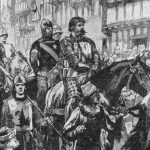
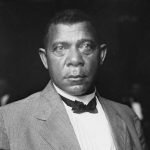


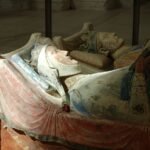



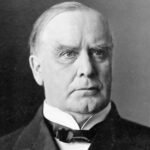



eyey
who are the editors of this page and when was it published? Thanks!